2012 Harvard Commencement Address
JK罗琳在哈佛大学毕业典礼上的演讲中英双语节选版
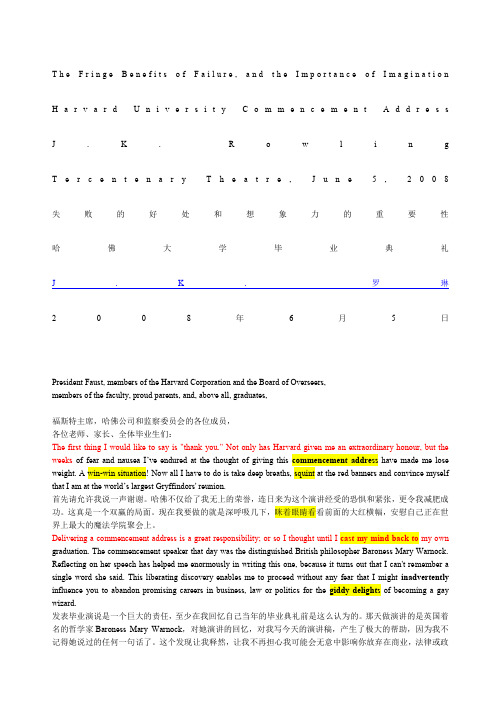
T h e F r i n g e B e n e f i t s o f F a i l u r e,a n d t h e I m p o r t a n c e o f I m a g i n a t i o n H a r v a r d U n i v e r s i t y C o m m e n c e m e n t A d d r e s s J.K.R o w l i n g T e r c e n t e n a r y T h e a t r e,J u n e5,2008 失败的好处和想象力的重要性哈佛大学毕业典礼J.K.罗琳2008年6月5日President Faust, members of the Harvard Corporation and the Board of Overseers,members of the faculty, proud parents, and, above all, graduates,福斯特主席,哈佛公司和监察委员会的各位成员,各位老师、家长、全体毕业生们:The first thing I would like to say is "thank you." Not only has Harvard given me an extraordinary honour, but the weeks of fear and nausea I’ve endured at the thought of giving this commencement address have made me lose weight. A win-win situation! Now all I have to do is take deep breaths, squint at the red banners and convince myself that I am at the world’s largest Gryffindors' reunion.首先请允许我说一声谢谢。
JK罗琳在哈佛的演讲--失败的附加值和想象力的重要性
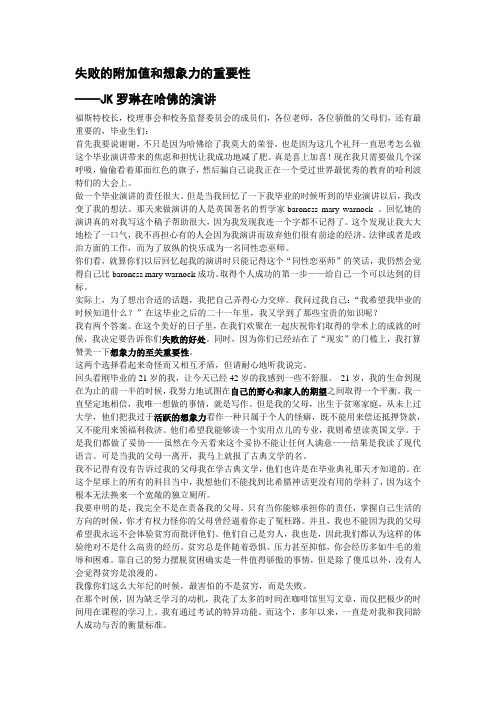
失败的附加值和想象力的重要性——JK罗琳在哈佛的演讲福斯特校长,校理事会和校务监督委员会的成员们,各位老师,各位骄傲的父母们,还有最重要的,毕业生们:首先我要说谢谢,不只是因为哈佛给了我莫大的荣誉,也是因为这几个礼拜一直思考怎么做这个毕业演讲带来的焦虑和担忧让我成功地减了肥。
真是喜上加喜!现在我只需要做几个深呼吸,偷偷看着那面红色的旗子,然后骗自己说我正在一个受过世界最优秀的教育的哈利波特们的大会上。
做一个毕业演讲的责任很大。
但是当我回忆了一下我毕业的时候听到的毕业演讲以后,我改变了我的想法。
那天来做演讲的人是英国著名的哲学家baroness mary warnock 。
回忆她的演讲真的对我写这个稿子帮助很大,因为我发现我连一个字都不记得了。
这个发现让我大大地松了一口气,我不再担心有的人会因为我演讲而放弃他们很有前途的经济、法律或者是政治方面的工作,而为了放纵的快乐成为一名同性恋巫师。
你们看,就算你们以后回忆起我的演讲时只能记得这个“同性恋巫师”的笑话,我仍然会觉得自己比baroness mary warnock成功。
取得个人成功的第一步——给自己一个可以达到的目标。
实际上,为了想出合适的话题,我把自己弄得心力交瘁。
我问过我自己:“我希望我毕业的时候知道什么?”在这毕业之后的二十一年里,我又学到了那些宝贵的知识呢?我有两个答案。
在这个美好的日子里,在我们欢聚在一起庆祝你们取得的学术上的成就的时候,我决定要告诉你们失败的好处。
同时,因为你们已经站在了“现实”的门槛上,我打算赞美一下想象力的至关重要性。
这两个选择看起来奇怪而又相互矛盾,但请耐心地听我说完。
回头看刚毕业的21岁的我,让今天已经42岁的我感到一些不舒服。
21岁,我的生命到现在为止的前一半的时候,我努力地试图在自己的野心和家人的期望之间取得一个平衡。
我一直坚定地相信,我唯一想做的事情,就是写作。
但是我的父母,出生于贫寒家庭,从未上过大学,他们把我过于活跃的想象力看作一种只属于个人的怪癖,既不能用来偿还抵押贷款,又不能用来领福利救济。
朱棣文演讲:生命太短暂,不能空手过!
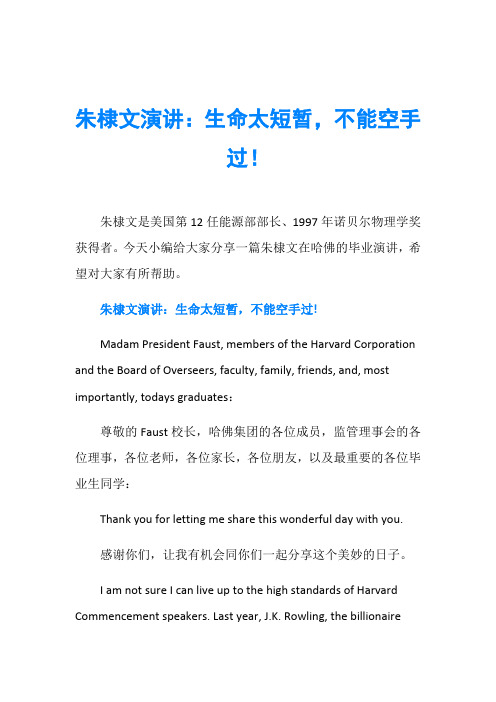
朱棣文演讲:生命太短暂,不能空手过!朱棣文是美国第12任能源部部长、1997年诺贝尔物理学奖获得者。
今天小编给大家分享一篇朱棣文在哈佛的毕业演讲,希望对大家有所帮助。
朱棣文演讲:生命太短暂,不能空手过!Madam President Faust, members of the Harvard Corporation and the Board of Overseers, faculty, family, friends, and, most importantly, todays graduates:尊敬的Faust校长,哈佛集团的各位成员,监管理事会的各位理事,各位老师,各位家长,各位朋友,以及最重要的各位毕业生同学:Thank you for letting me share this wonderful day with you.感谢你们,让我有机会同你们一起分享这个美妙的日子。
I am not sure I can live up to the high standards of Harvard Commencement speakers. Last year, J.K. Rowling, the billionairenovelist, who started as a classics student, graced this podium. The year before, Bill Gates, the mega-billionaire philanthropist and computer nerd stood here. Today, sadly, you have me. I am not wealthy, but at least I am a nerd.我不太肯定,自己够得上哈佛大学毕业典礼演讲人这样的殊荣。
去年登上这个讲台的是,英国亿万身家的小说家J.K. Rowling 女士,她最早是一个古典文学的学生。
名人重要演讲推荐英文作文

名人重要演讲推荐英文作文1. I highly recommend the famous speech given by Martin Luther King Jr. in 1963, known as "I Have a Dream." This speech is a powerful call for racial equality and justice, and it continues to inspire people around the world today.2. Another important speech to consider is Malala Yousafzai's address to the United Nations in 2013. Malala, a young Pakistani activist for girls' education, delivered a moving and courageous speech advocating for the right to education for all children.3. Steve Jobs' commencement address at Stanford University in 2005 is also a must-listen. In this speech, Jobs shares personal stories and reflections on life, work, and following one's passion, making it a trulyinspirational and thought-provoking talk.4. Oprah Winfrey's speech at the Golden Globes in 2018 is another standout. Her powerful words on the #MeToomovement and the fight for gender equality left a lasting impact and sparked important conversations around the world.5. Finally, I recommend the commencement speechdelivered by J.K. Rowling at Harvard University in 2008. In this speech, the beloved author of the Harry Potter series shares insights on the benefits of failure and the importance of imagination, making it a memorable anduplifting address.。
【9A文】新标准大学英语视听说教程1-课文翻译
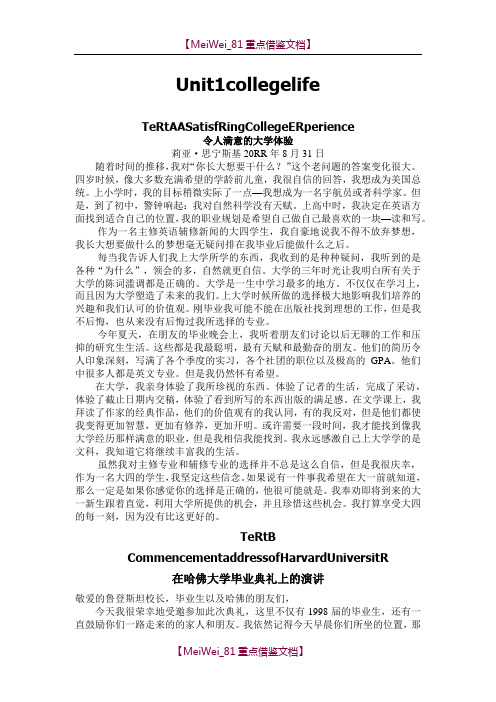
Unit1collegelifeTeRtAASatisfRingCollegeERperience令人满意的大学体验莉亚·思宁斯基20RR年8月31日随着时间的推移,我对“你长大想要干什么?”这个老问题的答案变化很大。
四岁时候,像大多数充满希望的学龄前儿童,我很自信的回答,我想成为美国总统。
上小学时,我的目标稍微实际了一点—我想成为一名宇航员或者科学家。
但是,到了初中,警钟响起:我对自然科学没有天赋。
上高中时,我决定在英语方面找到适合自己的位置,我的职业规划是希望自己做自己最喜欢的一块—读和写。
作为一名主修英语辅修新闻的大四学生,我自豪地说我不得不放弃梦想,我长大想要做什么的梦想毫无疑问排在我毕业后能做什么之后。
每当我告诉人们我上大学所学的东西,我收到的是种种疑问,我听到的是各种“为什么”,领会的多,自然就更自信。
大学的三年时光让我明白所有关于大学的陈词滥调都是正确的。
大学是一生中学习最多的地方。
不仅仅在学习上,而且因为大学塑造了未来的我们。
上大学时候所做的选择极大地影响我们培养的兴趣和我们认可的价值观。
刚毕业我可能不能在出版社找到理想的工作,但是我不后悔,也从来没有后悔过我所选择的专业。
今年夏天,在朋友的毕业晚会上,我听着朋友们讨论以后无聊的工作和压抑的研究生生活。
这些都是我最聪明,最有天赋和最勤奋的朋友。
他们的简历令人印象深刻,写满了各个季度的实习,各个社团的职位以及极高的GPA。
他们中很多人都是英文专业。
但是我仍然怀有希望。
在大学,我亲身体验了我所珍视的东西。
体验了记者的生活,完成了采访,体验了截止日期内交稿,体验了看到所写的东西出版的满足感。
在文学课上,我拜读了作家的经典作品,他们的价值观有的我认同,有的我反对,但是他们都使我变得更加智慧,更加有修养,更加开明。
或许需要一段时间,我才能找到像我大学经历那样满意的职业,但是我相信我能找到。
我永远感激自己上大学学的是文科,我知道它将继续丰富我的生活。
JK罗琳哈佛大学毕业典礼上的演讲:中英对照

Delivering a commencement address is a great responsibility; or so I thought until I cast my mind back to my own graduation.我一直以为,发表毕业致辞责任重大,直到我回想起我当年的毕业典礼。
The commencement speaker that day was the distinguished British philosopher Baroness Mary Warnock.那天为我们致辞的是英国著名的哲学家Baroness Mary Warnock。
Reflecting on her speech has helped me enormously in writing this one, because it turns out that I can't remember a single word she said.追忆她当年的演说,对我完成今天的演讲稿帮助极大。
因为我完全不记得她当年都讲了什么内容。
This liberating discovery enables me to proceed without any fear that I might inadvertently influence you to abandon promising careers in business, law or politics for the giddy delights of becoming a gay wizard.想到这里,我就如释重负继续往下说了,不用担心会无意间对你们造成什么影响,误导你们放弃在商业界、律师界或政界的大好前程,改去追寻魔法师的愉悦。
You see? If all you remember in years to come is the 'gay wizard' joke, I've still come out ahead of Baroness Mary Warnock. Achievable goals - the first step to self-improvement.看吧,如果多年之后你们都还记得这个欢快魔法师的笑话,我就超越了Warnock。
英语短文-英语短文:你的大学是不是必需读
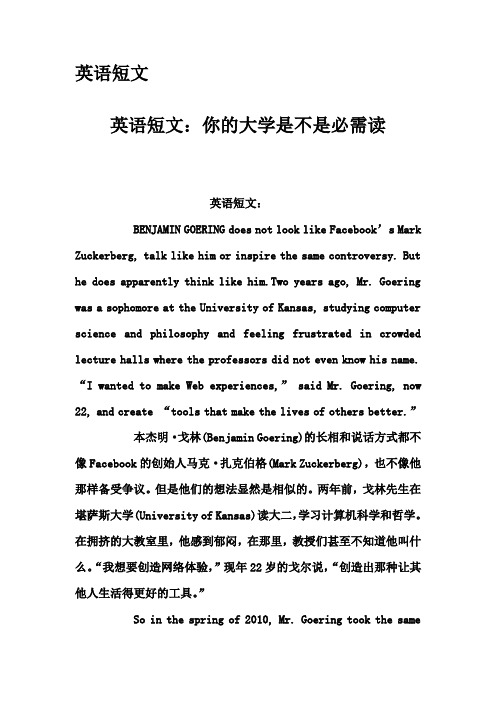
英语短文英语短文:你的大学是不是必需读英语短文:BENJAMIN GOERING does not look like Facebook’s Mark Zuckerberg, talk like him or inspire the same controversy. But he does apparently think like him.Two years ago, Mr. Goering was a sophomore at the University of Kansas, studying computer science and philosophy and feeling frustrated in crowded lecture halls where the professors did not even know his name.“I wanted to make Web experiences,” said Mr. Goering, now 22, and create “tools that make the lives of others better.”本杰明·戈林(Benjamin Goering)的长相和说话方式都不像Facebook的创始人马克·扎克伯格(Mark Zuckerberg),也不像他那样备受争议。
但是他们的想法显然是相似的。
两年前,戈林先生在堪萨斯大学(University of Kansas)读大二,学习计算机科学和哲学。
在拥挤的大教室里,他感到郁闷,在那里,教授们甚至不知道他叫什么。
“我想要创造网络体验,”现年22岁的戈尔说,“创造出那种让其他人生活得更好的工具。
”So in the spring of 2010, Mr. Goering took the sameleap as Mr. Zuckerberg: he dropped out of college and moved to San Francisco to make his mark. He got a job as a software engineer at a social-software company, Livefyre, run by a college dropout, where the chief technology officer at the time and a lead engineer were also dropouts. None were sheepish about their lack of a diploma. Rather, they were proud of their real-life lessons on the job.“Education isn’t a four-year program,” Mr. Goering said. “It’s a mind-set.”所以,在2010年的春天,戈尔先生跨出了和扎克伯格相同的一步:为了做出成绩,他从大学退学,搬去了旧金山。
朱棣文在哈佛大学毕业典礼英语演讲稿
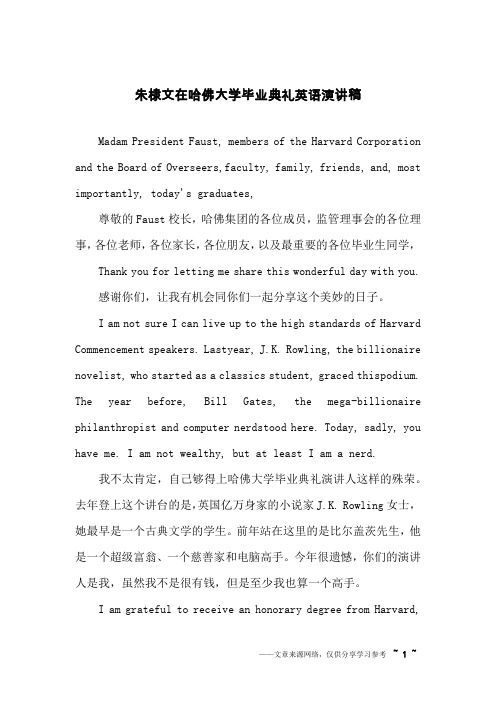
朱棣文在哈佛大学毕业典礼英语演讲稿Madam President Faust, members of the Harvard Corporation and the Board of Overseers,faculty, family, friends, and, most importantly, today's graduates,尊敬的Faust校长,哈佛集团的各位成员,监管理事会的各位理事,各位老师,各位家长,各位朋友,以及最重要的各位毕业生同学,Thank you for letting me share this wonderful day with you.感谢你们,让我有机会同你们一起分享这个美妙的日子。
I am not sure I can live up to the high standards of Harvard Commencement speakers. Lastyear, J.K. Rowling, the billionaire novelist, who started as a classics student, graced thispodium. The year before, Bill Gates, the mega-billionaire philanthropist and computer nerdstood here. Today, sadly, you have me. I am not wealthy, but at least I am a nerd.我不太肯定,自己够得上哈佛大学毕业典礼演讲人这样的殊荣。
去年登上这个讲台的是,英国亿万身家的小说家J.K. Rowling女士,她最早是一个古典文学的学生。
前年站在这里的是比尔盖茨先生,他是一个超级富翁、一个慈善家和电脑高手。
今年很遗憾,你们的演讲人是我,虽然我不是很有钱,但是至少我也算一个高手。
跟读100篇名人演讲

跟读100篇名人演讲跟读100篇名人演讲可以帮助提高口语表达能力和演讲技巧。
以下是一些著名的演讲,你可以选择其中的100篇进行跟读练习:1. Martin Luther King Jr. - "I Have a Dream"2. John F. Kennedy - Inaugural Address3. Abraham Lincoln - Gettysburg Address4. Winston Churchill - "We Shall Fight on the Beaches"5. Nelson Mandela - "I Am Prepared to Die"6. Barack Obama - Inaugural Address7. Malala Yousafzai - Nobel Peace Prize Acceptance Speech8. Steve Jobs - Stanford University Commencement Address9. Bill Gates - Harvard University Commencement Address10. Oprah Winfrey - Golden Globe Awards Acceptance Speech11. J.K. Rowling - Harvard University Commencement Address12. Ellen DeGeneres - Tulane University Commencement Address13. Michelle Obama - Democratic National Convention Speech14. Emma Watson - UN Women's HeForShe Campaign Speech15. George W. Bush - Address to the Nation on 9/1116. Ronald Reagan - "Tear Down This Wall"17. Franklin D. Roosevelt - Pearl Harbor Address to the Nation18. Hillary Clinton - Women's Rights are Human Rights19. Elon Musk - TED Talk on Tesla, SpaceX, and the Future of Humanity20. Mark Zuckerberg - Harvard University Commencement Address21. Steve Jobs - iPhone Introduction Keynote Address22. Mahatma Gandhi - Speech at Asian Relations Conference23. Sheryl Sandberg - TED Talk on Why We Have Too Few Women Leaders24. Michelle Obama - Time to Build a Nation of Fit Kids25. Martin Luther King Jr. - Nobel Peace Prize Acceptance Speech26. Desmond Tutu - Nobel Peace Prize Acceptance Speech27. Albert Einstein - Acceptance Speech for the Nobel Prize in Physics28. Greta Thunberg - United Nations Climate Action Summit Speech29. Serena Williams - TED Talk on Equality and Empowerment30. Mohandas Karamchand Gandhi - Quit India Speech31. Emma Gonzalez - March for Our Lives Speech32. Malala Yousafzai - Address to the United Nations Youth Assembly33. Tim Cook - Stanford University Commencement Address34. Michelle Obama - Beating the Odds, Becoming a Success35. Barack Obama - Speech on the Death of Osama bin Laden36. John F. Kennedy - "We Choose to Go to the Moon"37. Shonda Rhimes - Dartmouth College Commencement Address38. Dalai Lama - Nobel Peace Prize Acceptance Speech39. Ellen Johnson Sirleaf - Nobel Peace Prize Acceptance Speech40. Bill Gates - TED Talk on Mosquitoes, Malaria, and Education41. Winston Churchill - "Their Finest Hour"42. Kamala Harris - Democratic National Convention Speech43. Ruth Bader Ginsburg - Supreme Court Nomination Acceptance Speech44. Tim Cook - Acceptance Speech for the Anti-Defamation League Courage Against Hate Award45. Oprah Winfrey - Harvard University Commencement Address46. Richard Branson - TED Talk on Life at 30,000 Feet47. Chimamanda Ngozi Adichie - TED Talk on The Danger of a Single Story48. Angela Merkel - Address to the Bundestag on the Eurozone Debt Crisis49. Pope Francis - Address to the United Nations General Assembly50. Aung San Suu Kyi - Nobel Peace Prize Acceptance Speech51. Justin Trudeau - Address to the United Nations General Assembly52. Michelle Obama - Democratic National Convention Speech53. Ellen Johnson Sirleaf - Inaugural Address54. Indira Gandhi - Independence Day Speech55. Steve Jobs - Stanford University Commencement Address56. Kamala Harris - Vice Presidential Nomination Acceptance Speech57. Jeff Bezos - Princeton University Commencement Address58. Meghan Markle - United Nations Women's Conference Speech59. Sheryl Sandberg - Harvard Business School Class Day Speech60. Greta Thunberg - Climate Action Now Speech at the United Nations61. Ernesto Che Guevara - Address to the United Nations General Assembly62. Elon Musk - TED Talk on The Future We're Building -- and Boring63. Oprah Winfrey - Golden Globe Awards Acceptance Speech64. Kamala Harris - United States Senate Floor Speech on Immigration65. Malala Yousafzai - Nobel Peace Prize Acceptance Speech66. Aung San Suu Kyi - Address to the Nation on Democracy and Human Rights (1995)67. Dalai Lama - Nobel Peace Prize Acceptance Speech68. Desmond Tutu - Nobel Peace Prize Acceptance Speech69. Ruth Bader Ginsburg - Supreme Court Nomination Acceptance Speech70. Shonda Rhimes - Dartmouth College Commencement Address71. Martin Luther King Jr. - "I Have a Dream"72. Barack Obama - Inaugural Address73. John F. Kennedy - Inaugural Address74. Abraham Lincoln - Gettysburg Address75. Winston Churchill - "We Shall Fight on the Beaches"76. Nelson Mandela - "I Am Prepared to Die"77. Bill Gates - Harvard University Commencement Address78. Steve Jobs - Stanford University Commencement Address79. Emma Watson - UN Women's HeForShe Campaign Speech80. Elon Musk - TED Talk on Tesla, SpaceX, and the Future of Humanity81. Michelle Obama - Democratic National Convention Speech82. Barack Obama - Address to the Nation on 9/1183. Franklin D. Roosevelt - Pearl Harbor Address to the Nation84. Tim Cook - Stanford University Commencement Address85. Michelle Obama - Time to Build a Nation of Fit Kids86. Mahatma Gandhi - Speech at Asian Relations Conference87. Serena Williams - TED Talk on Equality and Empowerment88. Desmund Tutu - Nobel Peace Prize Acceptance Speech89. Sheryl Sandberg - TED Talk on Why We Have Too Few Women Leaders90. Kamala Harris - Democratic National Convention Speech91. Malala Yousafzai - Address to the United Nations Youth Assembly92. Dalai Lama - Nobel Peace Prize Acceptance Speech93. Michelle Obama - Beating the Odds, Becoming a Success94. Barack Obama - Speech on the Death of Osama bin Laden95. John F. Kennedy - "We Choose to Go to the Moon"96. Kamala Harris - Vice Presidential Nomination Acceptance Speech97. Greta Thunberg - Climate Action Now Speech at the United Nations98. Elon Musk - TED Talk on The Future We're Building -- and Boring99. Oprah Winfrey - Golden Globe Awards Acceptance Speech 100. Martin Luther King Jr. - Nobel Peace Prize Acceptance Speech这些演讲涵盖了不同领域的名人,包括政治家、科技企业家、人权倡导者、体育家和文化艺术家等。
实现梦想的英语演讲稿中的努力奋斗
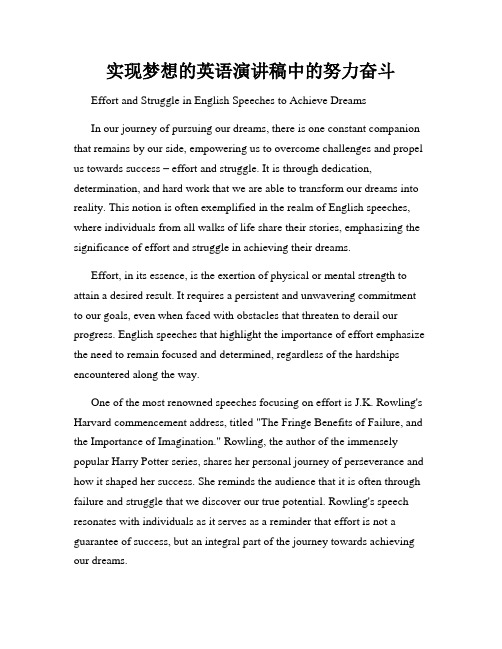
实现梦想的英语演讲稿中的努力奋斗Effort and Struggle in English Speeches to Achieve DreamsIn our journey of pursuing our dreams, there is one constant companion that remains by our side, empowering us to overcome challenges and propel us towards success – effort and struggle. It is through dedication, determination, and hard work that we are able to transform our dreams into reality. This notion is often exemplified in the realm of English speeches, where individuals from all walks of life share their stories, emphasizing the significance of effort and struggle in achieving their dreams.Effort, in its essence, is the exertion of physical or mental strength to attain a desired result. It requires a persistent and unwavering commitment to our goals, even when faced with obstacles that threaten to derail our progress. English speeches that highlight the importance of effort emphasize the need to remain focused and determined, regardless of the hardships encountered along the way.One of the most renowned speeches focusing on effort is J.K. Rowling's Harvard commencement address, titled "The Fringe Benefits of Failure, and the Importance of Imagination." Rowling, the author of the immensely popular Harry Potter series, shares her personal journey of perseverance and how it shaped her success. She reminds the audience that it is often through failure and struggle that we discover our true potential. Rowling's speech resonates with individuals as it serves as a reminder that effort is not a guarantee of success, but an integral part of the journey towards achieving our dreams.Struggle, on the other hand, refers to the conflict and resistance that we encounter on our path towards realizing our dreams. It pushes us beyond our comfort zones, forcing us to confront our fears and limitations. Although struggle may appear as an adversary, it is often the catalyst for growth and self-improvement. Many English speeches emphasize the transformative power of struggle and how it shapes our character.An inspiring example of this notion is Steve Jobs' 2005 Stanford commencement address, widely known as "Stay Hungry, Stay Foolish." Jobs, the co-founder of Apple Inc., shares his personal anecdotes of struggle, including his early failures and later successes. He encourages individuals to embrace the uncertainties of life and to view struggles as stepping stones to success. Through his speech, Jobs demonstrates the importance of perseverance and the immense personal growth that can be achieved through embracing challenges.Effort and struggle are not merely abstract concepts in the realm of English speeches, but rather powerful motivators that ignite the fire within us. These concepts manifest in various forms, such as overcoming adversity, defying expectations, or even challenging societal norms. The speeches that resonate with audiences the most are often those that encapsulate the struggles faced by individuals striving to achieve their dreams against all odds.One remarkable speech that exemplifies the triumph of effort and struggle is Malala Yousafzai's address to the United Nations Youth Assembly in 2013. Yousafzai, a Pakistani activist for female education and the youngest-ever Nobel Prize laureate, shares her courageous journey ofadvocating for girls' education and surviving an assassination attempt by the Taliban. Her speech illustrates the power of determination and resilience in the face of adversity. Yousafzai's story serves as an inspiration to millions, emphasizing the indomitable spirit that can emerge from the most challenging circumstances.In conclusion, effort and struggle are integral parts of the journey towards achieving our dreams, as exemplified by various English speeches. Effort pushes us to reach for our goals, maintaining our focus even in the face of failure. Struggle, on the other hand, shapes our character and propels us to our full potential. These speeches not only remind us of the importance of effort and struggle but also provide hope and inspiration for individuals determined to make their dreams a reality. It is through dedication, determination, and unwavering perseverance that we can transform our dreams into tangible achievements.。
哈佛大学校长Drew Faust在2012毕业典礼上的演讲

哈佛大学校长Drew Faust在2012毕业典礼上的演讲美国哈佛大学校长Drew Faust女士在2012毕业典礼上的演讲,同时Drew G. Faust也是哈佛375年历史上第一位女性校长,还是第一位非哈佛毕业生校长,杰出的历史学家,2001年从宾西法尼业大学到哈佛的Radcliffe学院任教。
这是她在2012年哈佛大学毕业典礼上的演讲英语文本。
With Commencem ent today, we close our year of commemorating Harvard’s 375th birthday. From an exuberant party for 18,000 in torrential rain and ankle-deep mud here in Tercentenary Theatre last fall to today’s invocation of John Harvard’s spirit still walking the Yard, w e have celebrated this special year and this institution’s singular and distinguished history. Founded by an act of the Great and General Court of the Massachusetts Bay Colony in 1636, Harvard was the first college in the English colonies and is the oldest in what has become the United States. Harvard was already 140 years old when the nation was founded. There are few institutions in this country or even the world that can claim such longevity.But what does such a claim mean? At a time when the buzzword o f “innovation” is everywhere, when the allure of the new drives business, politics and society, what do we intend by our celebration of endurance and of history? Why do we see history as an essential part of our identity? Why is Harvard’s past an invaluabl e resource as we decide how to shape the future?In a quite literal sense, history creates our identity – who we as Harvard actually are – and as a result who we aspire to be. We live in a community made up not just of the students, faculty and staff now here –or even the 300,000 Harvard alumni around the world. We are part of a community that extends across time as well as space. We acknowledge an indelible connection to those who have come before –predecessors both recent and remote, who remind us of what is possible for us by their demonstration of what was possible for them.Harvard’s history instills both expectations and responsibilities as it challenges us to inhabit this legacy. One cannot study philosophy here without sighting the ghosts of John Rawls, Willard Quine, Benjamin Peirce, Ralph Waldo Emerson, or William James. One cannot study law without thinking of the 18 Harvard Law School alumni who have served as Supreme Court justices, including the 6 currently on the bench – not to mention the graduate in the White House and the seven presidents with Harvard degrees who have preceded him. Those who appear on Harvard stages surely imagine themselves as Jack Lemmon or Natalie Portman or Stockard Channing, directed by the equivalents of Peter Sellars, Diane Paulus, or Mira Nair. Or perhaps our aspiring actors see themselves in John Lithgow and Tommy Lee Jones, who returned together for Arts First weekend earlier this month to reminisce about their thespian adventures in Cambridge. And those seeking to change the world through technology are sure to reflect on Zuckerberg, Ballmer, and Gates. In these domains and so many others, we have the privilege of living alongside a remarkable heritage of predecessors.We have certainly not come to work and study here in Cambridge and Boston because of the weather – though this past winter suggests climate change may be altering that. We are drawn here because others before us have set a standard that extends across centuries in its power and its appeal. We think of ourselves in their company; we seek to be worthy of that company, and to share our days with others similarly motivated and inspired. We want to contribute as they have contributed in every imaginable field. We want to know – to understand – societies, governments, eras, organizations, galaxies, works of art and literature, structures, circuits, diseases, cells. We want to make our lives matter. We want to improve the human condition and build a better world.We want Harvard to ask that of us, to expect that of us and to equip us to accomplish it.History shapes our institutional ideals as well as our individual ambitions. Having a history diminishes the grip of the myopic present, helping us to see beyond its bounds, to transcend the immediate in search of the enduring. It challenges us to place our aspirations and responsibilities within the broadest context of understanding.We expect the future to be as long as the past; we must act in ways that are not just about tomorrow – but about decades and even centuries to come. This means that we teach our students with the intention of shaping the whole of their lives as well as readying them for what happens as soon as they leave our gates. This means that in the sciences – and beyond – we support research that is driven by curiosity, by the sheer desire to understand – at the same time that we pursue discoveries that have immediate measurable impact. And it means that we support fields of study –of languages, literatures, cultures –that are intended to locate us within traditions of reflection about the larger purposes of human existence, enabling us to look beyond ourselves and our own experience, to ask where we are going – not just how we get there.Even in our professional Schools, designed to educate students for specific vocations, we seek to instill the perspective that derives from the critical eye and the questioning mind; we charge our students to think about lasting value, not just quarterly returns.These commitments shape our institutional identity – our discussions and decisions about what a university is and must be. As both higher education and the world have been transformed, Harvard has not just weathered the past 375 years. It has changed and flourished – from its origins as a small, local college designed to produce educated ministers and citizens, to its emergence as a research university in the late 19th century, to its transformation into a national institution, and its development after World War II as an engine of scientific discovery and economic growth, as well as a force for significantly broadening social opportunity.We are now in another moment of dramatic shift in higher education: Globalization and technology are prominent among the forces that challenge us once again to examine how we do our work and how we define our aims. This year alone we have launched a new University-wide initiative to think in fresh ways about our methods of learning and teaching, a new University-wide Innovation Lab to help our students bring their ideas to life, and edX, a new partnership with MIT to embrace the promise of online learning for our students while sharing our knowledge more widely with the world.As we reimagine ourselves for the 21st century, we recognize that history teaches us not just about continuity –what is important because it is enduring. History also teaches us about change. Harvard has survived and thrived by considering over and over again how its timeless and unwavering dedication to knowledge and truth must be adapted to the demands of each new age. History encourages us to see contingency and opportunity by offering us the ability to imagine a different world.Think of how Harvard changed as we came to recognize that our commitment to fulfilling human potential required us to open our gates more broadly. The continuity of our deepest values led us to the transformation of our practices – and of the characteristics of the students, faculty and staff who inhabit and embody Harvard. What was once unimaginable came to seem necessary and even inevitable as we extended the circle of inclusion and belonging to welcome minorities and women, and in recent years to so significantly enhance support for students of limited financial means. Our history provides “a compass to steer by” –to borrow a phrase from Massachusetts BayGovernor John Winthrop. It fills us with confidence in our purposes and in our ability to surmount the risks of uncharted seas. With the strength of our past, we welcome these unknowns and the opportunities they offer as we reimagine Harvard for its next 375 years. For nearly four centuries now, Harvard has been inventing the future. History is where the future begins.Thank you very much.。
演讲稿 朱棣文演讲:生命太短暂,不能空手过!
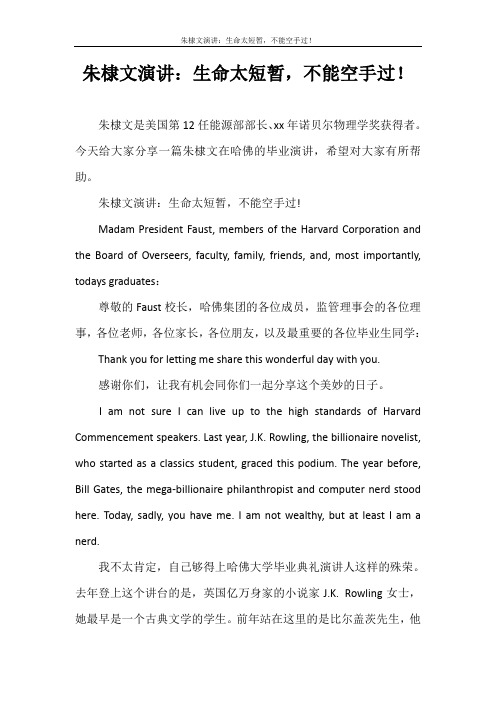
朱棣文演讲:生命太短暂,不能空手过!朱棣文是美国第12任能源部部长、xx年诺贝尔物理学奖获得者。
今天给大家分享一篇朱棣文在哈佛的毕业演讲,希望对大家有所帮助。
朱棣文演讲:生命太短暂,不能空手过!Madam President Faust, members of the Harvard Corporation and the Board of Overseers, faculty, family, friends, and, most importantly, todays graduates:尊敬的Faust校长,哈佛集团的各位成员,监管理事会的各位理事,各位老师,各位家长,各位朋友,以及最重要的各位毕业生同学:Thank you for letting me share this wonderful day with you.感谢你们,让我有机会同你们一起分享这个美妙的日子。
I am not sure I can live up to the high standards of Harvard Commencement speakers. Last year, J.K. Rowling, the billionaire novelist, who started as a classics student, graced this podium. The year before, Bill Gates, the mega-billionaire philanthropist and computer nerd stood here. Today, sadly, you have me. I am not wealthy, but at least I am a nerd.我不太肯定,自己够得上哈佛大学毕业典礼演讲人这样的殊荣。
去年登上这个讲台的是,英国亿万身家的小说家J.K. Rowling女士,她最早是一个古典文学的学生。
震撼心灵的28篇英语演讲

震撼心灵的28篇英语演讲以下是28篇震撼心灵的英语演讲,总字数超过1500字。
1. Steve Jobs - Stanford Commencement Speech (2005)This iconic speech by Steve Jobs emphasizes the importance of finding one's passion and pursuing it with determination, even in the face of adversity. Jobs shares his personal experiences and encourages the graduates to follow their dreams, reminding them that time is limited and should not be wasted.2. Malala Yousafzai –United Nations Speech (2013)Malala Yousafzai, a Pakistani education activist and Nobel Peace Prize laureate, delivered a powerful speech to the United Nations advocating for girls' right to education. She speaks passionately about women's empowerment and the need to fight against gender inequality.3. Martin Luther King Jr. –"I Have a Dream" Speech (1963)One of the most famous speeches in history, Martin Luther King Jr.'s "I Have a Dream" speech is a powerful call for equality and justice. King shares his vision for a future where people are judged by their character rather than the color of their skin.4. Ellen DeGeneres –Tulane University Commencement Speech (2009) Ellen DeGeneres' lighthearted and inspiring commencement speech at Tulane University encourages graduates to embrace failure and be true to themselves. She shares personal anecdotes and reminds students to always be kind and compassionate.5. J.K. Rowling –Harvard University Commencement Speech (2008) J.K. Rowling, the author of the beloved Harry Potter series, delivered a heartfelt speech at Harvard University. She talks about the power of imagination, the importance of failure, and the value of empathy.6. Nelson Mandela –Inaugural Address (1994)Nelson Mandela's inaugural address as the first black president of South Africa is a testament to the power of forgiveness and reconciliation. He calls for unity and emphasizes the need to move forward as a nation.7. Emma Watson –United Nations Speech on Gender Equality (2014) In this speech, actress and activist Emma Watson highlights the importance of gender equality and challenges societies to redefine gender roles. She sets out the "HeForShe" campaign, which calls for men to actively support women's rights.8. Barack Obama –Yes We Can Speech (2008)Barack Obama's inspiring "Yes We Can" speech during his presidential campaign in 2008 resonated with many Americans. He calls for hope, change, and unity, emphasizing that together, they can overcome challenges and create a better future.9. Oprah Winfrey –Stanford University Commencement Speech (2008) Oprah Winfrey shares her personal journey of success and emphasizes the importance of finding one's purpose in life. She encourages graduates to follow their passion and make a difference in the world.10. Winston Churchill –"We Shall Fight on the Beaches" Speech (1940) Winston Churchill's famous speech during World War II rallied the British people to stay strong and resilient in the face of adversity. He delivers a powerful message of determination, courage, and unwavering resolve.11. Michelle Obama –Democratic National Convention Speech (2012) Former First Lady Michelle Obama's speech at the Democratic National Convention in 2012 focused on the importance of values, hard work, and resilience in achieving success. She chronicles her own journey and emphasizes the importance of giving back.12. Charlie Chaplin –"The Great Dictator" Speech (1940)Charlie Chaplin's powerful speech from his film "The Great Dictator" delivers a strong message against authoritarianism and calls for unity and compassion among humanity.13. William Shakespeare –"To be, or not to be" Soliloquy from Hamlet (1603)Shakespeare's famous soliloquy from Hamlet reflects on the existential question of life and death. It delves into the complexity of human nature and the choices we make.14. Nelson Mandela –"An Ideal for Which I Am Prepared to Die" Speech (1964)Nelson Mandela's defense speech during his trial in 1964 showcases his unwavering commitment to equality, justice, and freedom. He expresses his willingness to sacrifice everything for the ideals he believes in.15. Greta Thunberg –United Nations Climate Action Summit Speech (2019)Greta Thunberg, a young climate activist, delivers a passionate speech at the United Nations Climate Action Summit. She criticizes world leaders for their inaction on climate change and calls for immediate action tosave the planet.16. Ronald Reagan –"Tear Down This Wall" Speech (1987)Ronald Reagan's speech in Berlin calling for the demolition of the Berlin Wall is seen as a catalyst for the reunification of Germany. It symbolizes his commitment to freedom and the triumph of democracy over communism.17. Ruth Bader Ginsburg –Harvard University Commencement Speech (2011)Supreme Court Justice Ruth Bader Ginsburg's speech at Harvard University celebrates the progress made in gender equality and advocates for continued efforts to achieve equal rights for all.18. Aung San Suu Kyi –Nobel Peace Prize Acceptance Speech (2012) Aung San Suu Kyi, the leader of Myanmar's democracy movement, delivered a speech upon receiving the Nobel Peace Prize. She speaks about the importance of democracy, peace, and freedom, and calls for international support.19. Martin Luther King Jr. –"I've Been to the Mountaintop" Speech (1968)Martin Luther King Jr.'s final speech before his assassination, "I've Been to the Mountaintop," is a powerful call to action. He reflects on his life's work, expresses his commitment to the civil rights movement, and urges his followers to persevere.20. Mother Teresa –Nobel Peace Prize Acceptance Speech (1979) Mother Teresa's humble and heartfelt Nobel Peace Prize acceptance speech focuses on the power of love and compassion. She advocates for serving the marginalized and emphasizes the importance of small acts of kindness.21. Harvey Milk –Hope Speech (1978)In this iconic speech, openly gay politician Harvey Milk delivers a message of hope and encouragement to the LGBTQ+ community. He calls for unity and urges individuals to come out and fight for their rights.22. Anne Frank –"The Diary of a Young Girl" (1944)Although not a traditional speech, Anne Frank's diary entries are incredibly impactful and provide a glimpse into the life of a young Jewish girl during the Holocaust. Her words leave a lasting impact on the horrors of war and the resilience of the human spirit.23. John F. Kennedy –Inaugural Address (1961)John F. Kennedy's inaugural address is remembered for its famous line, "Ask not what your country can do for you; ask what you can do for your country." He calls for unity and encourages citizens to be active participants in creating a better society.24. Susan B. Anthony –"Women's Right to Vote" Speech (1873) Susan B. Anthony's influential speech advocating for women's right to vote highlights the importance of equal representation and the fight for gender equality.25. Nelson Mandela –Rivonia Trial Speech (1964)During his trial for sabotage and conspiracy, Nelson Mandela delivers a powerful speech defending his beliefs and advocating for equality and justice. He calls for a society free from racial discrimination and oppression.26. Oprah Winfrey –Golden Globe Awards Speech (2018)In her powerful acceptance speech for the Cecil B. DeMille Award, Oprah Winfrey speaks about the importance of speaking truth to power and advocates for a more inclusive and equal society.27. Theodore Roosevelt –"The Man in the Arena" Speech (1910) Theodore Roosevelt's speech highlights the importance of taking action and not being afraid of failure. He emphasizes the value of perseverance and courage in achieving success.28. Princess Diana –"Giving a Voice to the Voiceless" Speech (1997) Princess Diana's speech at the Red Cross Headquarters focuses on the importance of empathy and giving a voice to those who are marginalized and suffering. She calls for compassion and action to make a positive impact on the world.These 28 speeches cover a wide range of topics, from civil rights and gender equality to climate change and personal resilience. Each speech aims to inspire and provoke thought, leaving a lasting impact on the audience.。
英语文章背诵精选40篇

英语文章背诵精选40篇以下是一些适合英语学习者背诵的精选文章,这些文章主题广泛,包括故事、诗歌、新闻、演讲等。
请注意,这里只提供了10篇精选文章,大家可以根据个人兴趣和需求选择适合自己的文章进行背诵。
1、The Love of a ParentThis is the love of a parent。
A love that's patient and kind。
A love that's never ending。
A love that's full of forgiveness。
A love that's true and pure.This is the love of a parent。
A love that's unconditional。
A love that's deep and broad。
A love that always protects。
A love that will never fade.This is the love of a parent。
A love that's full of joy and peace。
A love that will never be shattered。
A love that will always persevere。
A love that will never cease.2、The DaffodilIn early spring, when the sun shines bright。
A yellow daffodil greets the light.Its petals are like little cups of gold。
Fill them with sunshine and they smile and nod. The daffodil's leaves are like green fans。
娜塔莉·波特曼在哈佛大学毕业典礼上的演讲

Hello ,class of 2015.I am so honest to be here today.Dean Khurana ,faculty ,parents ,and most especially graduating students.Thank you so much for inviting me.I have to admit that today ,even 12years after graduation.I ’m still insecure about my own worthless.I have to remind myself today you ’re here for a reason.Today I feel much like I did when I came to Harvard Yard now so much affected as to make it almost impossible for her to appear tolerably cheerful.Their engagements at Rosings were as frequent during the last week of her stay as they had been at first.The very last evening was spent there ;and her Ladyship again enquired minutely into the particulars of their journey ,gave them directions as to the best method of packing ,and was so urgent on the necessity of placing gowns in the only right way ,that Maria thought herself obliged ,on her return ,to undo all the work of the morning ,and pack her trunk afresh.When they parted ,Lady Catherine ,with great condescension ,wished them a good journey ,and invited them to come to Hunsford again next year ;and Miss De Bourgh exerted herself so far as to curtsey and hold out her hand to both.激,连强颜欢笑也几乎办不到了,这是可想而知的。
JK罗琳在哈佛大学毕业典礼上的演讲

J·K·罗琳在哈佛大学毕业典礼上的演讲《失败的好处和想象的重要性》(The Fringe Benefits of Failure, and the Importance of Imagination)。
她几乎没有谈到哈里波特,而是说了年轻时的一些经历。
虽然J·K·罗琳现在很有钱,是英国仅次于女皇的最富有的女人,但是她曾经有一段非常艰辛的日子,30岁了,还差点流落街头。
她主要谈的是,自己从这段经历中学到的东西。
二、她首先回忆了自己大学毕业的情景:I was convinced that the only thing I wanted to do, ever, was to write novels. However, my parents, both of whom came from impoverished backgrounds and neither of whom had been to college, took the view that my overactive imagination was an amusing personal quirk that could never pay a mortgage, or secure a pension.当时,我只想去写小说。
但是,我的父母出身贫寒,没有受过大学教育。
他们认为,我那些不安分的想象力只是一种怪癖,根本不能用来还房贷,或者挣来养老金。
They had hoped that I would take a vocational degree; I wanted to study English Literature. A compromise was reached that in retrospect satisfied nobody, and I went up to study Modern Languages. Hardly had my parents’ car rounded the corner at the end of the road than I ditched German and scuttled off down the Classics corridor.他们希望我再去读个专业学位,而我想去攻读英国文学。
查理芒格在南加州大学毕业典礼上的演讲
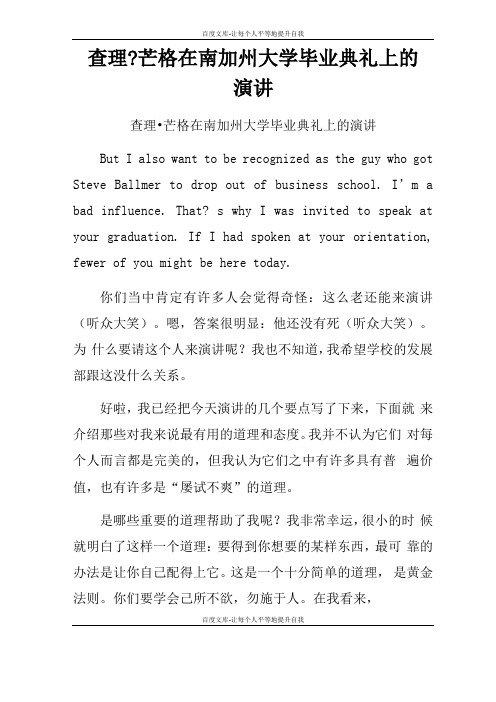
百度文库-让每个人平等地提升自我查理?芒格在南加州大学毕业典礼上的演讲查理•芒格在南加州大学毕业典礼上的演讲But I also want to be recognized as the guy who got Steve Ballmer to drop out of business school. I’m a bad influence. That? s why I was invited to speak at your graduation. If I had spoken at your orientation, fewer of you might be here today.你们当中肯定有许多人会觉得奇怪:这么老还能来演讲(听众大笑)。
嗯,答案很明显:他还没有死(听众大笑)。
为什么要请这个人来演讲呢?我也不知道,我希望学校的发展部跟这没什么关系。
好啦,我已经把今天演讲的几个要点写了下来,下面就来介绍那些对我来说最有用的道理和态度。
我并不认为它们对每个人而言都是完美的,但我认为它们之中有许多具有普遍价值,也有许多是“屡试不爽”的道理。
是哪些重要的道理帮助了我呢?我非常幸运,很小的时候就明白了这样一个道理:要得到你想要的某样东西,最可靠的办法是让你自己配得上它。
这是一个十分简单的道理,是黄金法则。
你们要学会己所不欲,勿施于人。
在我看来,百度文库-让每个人平等地提升自我无论是对律师还是对其他人来说,这都是他们最应该有的精神。
总的来说,拥有这种精神的人在生活中能够赢得许多东西,他们赢得的不止是金钱和名誉。
还赢得尊敬,理所当然地赢得与他们打交道的人的信任。
能够赢得别人的信任是非常快乐的事情。
我很小就明白的第二个道理是,正确的爱应该以仰慕为基础,而且我们应该去爱那些对我们有教育意义的先贤。
我懂得这个道理且一辈子都在实践它。
另外一个道理一一这个道理可能会让你们想起孔子一一获得智慧是一种道德责任,它不仅仅是为了让你们的生活变得更加美好。
十大英文经典演讲稿

十大英文经典演讲稿1. "I Have a Dream" by Martin Luther King Jr. - This iconic speech calls for an end to racism and inequality in the United States and remains a powerful message for equality and justice.2. "The Power of Vulnerability" by Brené Brown - In this TED Talk, Brown discusses the importance of embracing vulnerability and how it can lead to greater connection and authenticity.3. "The Man in the Arena" by Theodore Roosevelt - This speech encourages individuals to embrace challenges and not fear failure, emphasizing the importance of taking action and showing bravery.4. "The Gettysburg Address" by Abraham Lincoln - Lincoln's address at the Gettysburg battlefield is a powerful tribute to those who fought and died in the Civil War, emphasizing the importance of liberty and equality.5. "Stay Hungry, Stay Foolish" by Steve Jobs - In his commencement address at Stanford University, Jobs speaks about the value of following one's passion and taking risks in life.6. "Do Not Despair" by J.K. Rowling - Rowling's Harvard commencement speech focuses on the benefits of failure, emphasizing the importance of perseverance and finding meaning in difficult times.7. "A Time for Choosing" by Ronald Reagan - This speech by Reagan is a passionate argument for small government and individual freedom, making the case against excessive government intervention.8. "Equality for All" by Malala Yousafzai - Yousafzai's speech highlights the importance of education for all children and the fight for women's rights, calling for equality and unity.9. "The Struggle for Human Rights" by Nelson Mandela - Mandela's speech emphasizes the significance of human rights andthe fight against injustice and discrimination.10. "What to the Slave is the Fourth of July?" by Frederick Douglass - Douglass's speech challenges the hypocrisy of celebrating freedom while denying it to enslaved people, emphasizing the need for justice and equality for all.。
Oprah(奥普拉)哈佛大学毕业典礼演讲实录(中英文)

Oprah(奥普拉)哈佛大学毕业典礼演讲实录(中英文)演讲稿一般都是励志的,推动我们向前的,如果你迷茫或悲观,过来看看小编整理的Oprah(奥普拉)哈佛大学毕业典礼演讲实录(中英文)吧,希望对你有所帮助。
美国脱口秀天后,国际知名慈善家奥普拉·温弗瑞(Oprah Winfrey),5月30日应邀至哈佛大学获颁荣誉法学博士学位,并在毕业典礼发表演说。
她敦促毕业生乐于接受挫折,视之为成长的契机,并在生活与事业中追求为他人服务的机会。
她告诉毕业生:“人生没有失败这档事,所谓失败只是让人生转个弯。
有时难免会陷入挣扎卡在困境中,不过你想创造的人生故事会带着你走出去。
”Failure gave me an inner security that I had never attained by passing examinations. Failure taught me things about myself that I could have learned no other way. I discovered that I had a strong will, and more discipline than I had suspected; I also found out that I had friends whose value was truly above rubies.Oh my goodness! I’m at Harvard! Wow! To President Faust, my fellow honorans, Carl [Muller] that was so beautiful, thank you so much, and James Rothenberg, Stephanie Wilson, Harvard faculty, with a special bowto my friend Dr. Henry Lewis Gates. All of you alumni, with a special bow to the Class of ’88, your hundred fifteen million dollars. And to you, members of the Harvard class of XX! Hello!我的天啊!我在哈...佛!真的!尊敬的Faust校长、和我一起获得荣誉学位的各位,Carl(注:Carl Muller哈佛校友会主席),真是太棒了,谢谢你们!还有James Rothenberg, Stephanie Wilson和哈佛的教职工们,特别感谢我的朋友Henry Lewis Gates博士(注:美国知名黑人教授)!感谢所有的哈佛校友,特别要感谢88届的毕业生,你们为哈佛捐出一亿一千五百万美元(注:哈佛历史上最多的一次同一班次校友捐款)。
福布斯哈佛经典演讲稿

福布斯哈佛经典演讲稿(最新版)编制人:__________________审核人:__________________审批人:__________________编制单位:__________________编制时间:____年____月____日序言下载提示:该文档是本店铺精心编制而成的,希望大家下载后,能够帮助大家解决实际问题。
文档下载后可定制修改,请根据实际需要进行调整和使用,谢谢!并且,本店铺为大家提供各种类型的实用范文,如演讲范文、工作总结、文秘知识、条据书信、行政公文、活动报告、党团范文、其他范文等等,想了解不同范文格式和写法,敬请关注!Download tips: This document is carefully compiled by this shop. I hope that after downloading it, it can help you solve practical problems. The document can be customized and modified after downloading, please adjust and use it according to actual needs, thank you!In addition, this shop provides you with various types of practical sample essays, such as speech sample essays, work summary, secretarial knowledge, article letters, administrative official documents, activity reports, party group template essays, other sample essays, etc. I want to understand the format and writing of different sample essays stay tuned!正文内容哈佛大学(Harvard University),简称哈佛,坐落于美国马萨诸塞州剑桥市,是一所享誉世界的私立研究型大学,是著名的常春藤盟校成员。
- 1、下载文档前请自行甄别文档内容的完整性,平台不提供额外的编辑、内容补充、找答案等附加服务。
- 2、"仅部分预览"的文档,不可在线预览部分如存在完整性等问题,可反馈申请退款(可完整预览的文档不适用该条件!)。
- 3、如文档侵犯您的权益,请联系客服反馈,我们会尽快为您处理(人工客服工作时间:9:00-18:30)。
Jon Chase/Harvard Staff PhotographerFareed Zakaria addressed the Harvard Alumni Association during the Afternoon Exercises at Harvard's 361st Commencement.“We live in an age of progress”Commencement address by Fareed Zakaria [as prepared]May 24, 2012Thank you so much, President Faust, Fellows of the Corporation, Overseers, Ladies and Gentlemen, and graduates.To the graduates in particular, I have to tell you, you’re way ahead of me already. I never made it to my commencement, either from college or graduate school. I went to college south of here, in a small town called New Haven, Connecticut. And, well, I celebrated a bit the night before the ceremony. The honest truth is, I slept throughmuch of my commencement. Then, after I had finally made it to Harvard for graduate school, I took a job before I had finished my Ph.D., and wrote the final chapters while working in New York. I couldn’t get away from work for Commencement, and I got my degree in the mail. So, 19 years later, it is a great honor to receive, in person, a Harvard degree.Harvard was, for me, a revelation. Contrary to the conventional wisdom on this campus, it is possible to receive a fine education at Yale, and I did. But Harvard’s great graduate programs have an ambition, energy, and range that, for me, made it a dazzling, electric experience. Getting a Ph.D. involves many hours of grueling work, but, if you do it right, also many hours of goofing off with friends, acquiring new hobbies and interests, and working your way through the great resources here — from the libraries to cafes. I fully availed myself of these opportunities, and the time spent not working (in a formal sense) was as valuable as the hours in seminar rooms. I learned from students, faculty, and visitors. Harvard is really where I learned to think, and I owe this University a deep debt of gratitude, as most of you do as well —something the University will remind you of from time to time.I have always been wary of making commencement speeches because I don’t t hink of myself as old enough to have any real wisdom to impart on such an august occasion. I’d like to think I’m still vaguely post-graduate. But there’s nothing like having kids to remind me of how deeply uncool I am. So I accept this task, with some trepidation.The best commencement speech I ever read was by the humorist Art Buchwald. He was brief, saying simply, “Remember, we are leaving you a perfect world. Don’t screw it up.”You are not going to hear that message much these days. Instead, you’re li kely to hear that we are living through grim economic times, that the graduates are entering the slowest recovery since the Great Depression. The worries are not just economic. Eversince 9/11, we have lived in an age of terror, and our lives remain altered by the fears of future attacks and a future of new threats and dangers. Then there are larger concerns that you hear about: The Earth is warming; we’re running out of water and other vital resources; we have a billion people on the globe trapped in terrible poverty.So, I want to sketch out for you, perhaps with a little bit of historical context, the world as I see it.The world we live in is, first of all, at peace —profoundly at peace. The richest countries of the world are not in geopolitical competition with one another, fighting wars, proxy wars, or even engaging in arms races or “cold wars.” This is a historical rarity. You would have to go back hundreds of years to find a similar period of great power peace. I know that you watch a bomb going off in Afghanistan or hear of a terror plot in this country and think we live in dangerous times. But here is the data. The number of people who have died as a result of war, civil war, and, yes, terrorism, is down 50 percent this decade from the 1990s. It is down 75 percent from the preceding five decades, the decades of the Cold War, and it is, of course, down 99 percent from the decade before that, which is World War II. Steven Pinker says that we are living in the most peaceful times in human history, and he must be right because he is a Harvard professor.The political stability we have experienced has allowed the creation of a single global economic system, in which countries around the world are participating and flourishing. In 1980, the number of countries that were growing at 4 percent a year —robust growth —was around 60. By 2007, it had doubled. Even now, after the financial crisis, that number is more than 80. Even in the current period of slow growth, keep in mind that the global economy as a whole will grow 10 to 20 percent faster this decade than it did a decade ago, 60 percent faster than it did two decades ago, and five times as fast as it did three decades ago.The result: The United Nations estimates that poverty has been reduced more in the past 50 years than in the previous 500 years. And much of that reduction has taken place in the last 20 years. The average Chinese person is 10 times richer than he or she was 50 years ago —and lives for 25 years longer. Life expectancy across the world has risen dramatically. We gain five hours of life expectancy every day —without even exercising! A third of all the babies born in the developed world this year will live to be 100.All this is because of rising standards of living, hygiene, and, of course, medicine. Atul Gawande, a Harvard professor who is also a practicing surgeon, and who also writes about medicine for The New Yorker, writes about a 19th century operation in which the surgeon was trying to amputate his patient’s leg. He succeeded — at that —but accidentally amputated his assistant’s finger as well. Both died of sepsis, and an onlooker died of shock. It is the only known medical procedure to have a 300 percent fatality rate. We’ve come a long way.To understand the astonishing age of progress we are living in, you just look at the cellphones in your pockets. (Many of you have them out and were already looking at them. Don’t think I can’t see you.) Your cellphones have more computing power than the Apollo space capsule. That capsule couldn’t even Tweet! So just imagine the opportunities that lie ahead. Moore’s Law — that computing power doubles every 18 months while costs halve — may be slowing down in the world of computers, but it is accelerating in other fields. The human genome is being sequenced at a pace faster than Moore’s Law. A “Third Industrial Revolution,” involving material science and the customization of manufacturing, is yet in its infancy. And all these fields are beginning to intersect and produce new opportunities that we cannot really foresee.The good news goes on. Look at the number of college graduates globally. It has risen fourfold in the last four decades for men, but it has risen sevenfold for women. I believe that the empowerment of women, whether in a village in Africa or aboardroom in America, is good for the world. If you are wondering whether women are in fact smarter than men, the evidence now is overwhelming: yes. My favorite example of this is a study done over the last 25 years in which it found that female representatives in the House of Congress were able to bring back $49 million more in federal grants than their male counterparts. So it turns out women are better than men even at pork-barrel spending. We can look forward to a world enriched and ennobled by women’s voices.Now you might listen to me and say “This is all wonderful for the world at large, but what does this mean for America?” Well, for America and for most places, peace and broader prosperity —“the rise of the rest” — means more opportunities. I remind you that this is a country that still has the largest and most dynamic economy in the world, that dominates the age of technology, that hosts hundreds of the world’s greatest companies, that houses its largest, deepest capital markets, and that has almost all of the world’s greatest universities. There is no equivalent of Harvard in China or India, nor will there be one for decades, perhaps longer.The United States is also a vital society. It is the only country in the industrialized world that is demographically vibrant. We add 3,000,000 people to the country every year. That itself is a powerful life force, and it is made stronger by the fact that so many of these people are immigrants. They —I should say we —come to this country with aspirations, with hunger, with drive, with determination, and with a fierce love for America. By 2050, America will have a better demographic profile than China. This country has its problems, but I would rather have America’s problems than most any other place in the world.When I tell you that we live in an age of progress, I am not urging complacency — far from it. We have had daunting challenges over the last 100 years: a depression, two world wars, a Cold War, 9/11, and global economic crisis. But we have overcome them by our response. Human action and human achievement have managed to tackleterrible problems.We forget our successes. In 2009, the H1N1 virus broke out in Mexico. Now, if you looked back at the trajectory of these kinds of viruses, it is quite conceivable this one would have spread like the Asian flu in 1957 or 1968, in which 4,000,000 people died. But this time, the Mexican health authorities identified the problem early, shared the information with the WHO, learned best practices fast, tracked down where the outbreak began, quarantined people, and vaccinated others. The country went on a full-scale alert, banning any large gatherings. In a Catholic country, you couldn’t go to church for three Sundays. Perhaps more importantly, you c ouldn’t go to soccer matches either. The result was that the virus was contained, to the point where, three months later, people wondered what the big fuss was and asked if we had all overreacted. We didn’t overreact; we reacted, we responded, and we solve d the problem.There are other examples. In the 12 months following the economic peak in 2008, industrial production fell by as much as it did in the first year of the depression. Equity prices and global trade fell more. Yet this time, no Great Depression followed. Why? Because of the coordinated actions of governments around the world. 9/11 did not usher in an age of terrorism, with al-Qaida going from strength to strength. Why? Because countries cooperated in fighting them and other terror groups, with considerable success. When we can come together, when we cooperate, when we put aside petty differences, the results are astounding.So, when we look at the problems we face —economic crises, terrorism, climate change, resource scarcity — keep in mind that these problems are real, but also that the human reaction and response to them will also be real. We can more easily map out the big problem than the thousands of individual actions governments, firms, organizations, and people will take that will constitute the solution.In a sense, I’m betting on the graduates in this great audience. I believe that your actions will have consequences. Your efforts will make a difference.And turning to the graduates, I know I am expected to provide some advice at a commencement. Should you go into nanotechnology or bioengineering? What are the industries of the future? Honestly, I have no idea. But one thing I do know is that human beings will reward and honor those talents of heart and mind they have always honored for thousands of years: intelligence, hard work, discipline, courage, loyalty and, perhaps above all, love and a generosity of spirit. Those are the qualities that, at the end of the day, make you live a great life, one that is rewarded by the outside world, and a good life, one that is rewarded only by those who know you best. These are the virtues that people honor, that they built statues for 5,000 years ago. Well, nobody builds statues anymore. They build weird, modernist sculptures with strange pieces of metal falling off of them, but you get my idea. Trust yourself; you know what you should do. You know the kind of life you should live. You don’t need an ethics course to know what you shouldn’t do. Just trust in your instincts, be true to them, and you will make for yourself a great and a good life. And, in doing so, you will change the world.I said that at my age I don’t feel competent to give you much advice, but I will give you one last piece of wisdom that comes with age. For all of you who are graduating students or, really, anyone who is still young, trust me. You cannot possibly understand the love that your parents have for you until you have children of your own. Once you have your own kids, their strange behavior will suddenly make sense. But don’t wait that long. On this day of all days, give them a hug, and tell them that you love them.Thank you, ladies and gentlemen, and to the graduates of Harvard University’s Class of 2012, Godspeed.。
